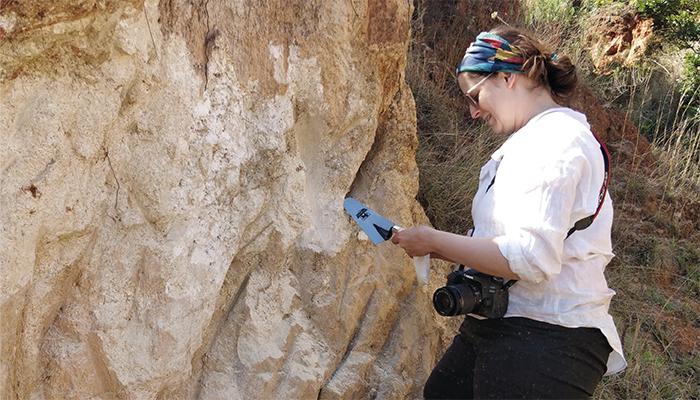Explore the latest breakthroughs in mass spectrometry, including a novel method for identifying tumor-specific neoepitopes, a GC-MS/MS workflow for detecting organochlorine pesticides, and advanced HPLC-Orbitrap MS techniques for screening new psychoactive substances

University of Missouri scientist Brandi L. MacDonald collects ochre and clay raw materials in Eswatini, southern Africa, for the study.
Photo courtesy Brandi L. MacDonald, Gregor Bader and Jörg Linstädter
FLiP-MS: A Turn for the Better in Protein Interaction Analysis
First developed by researchers at ETH Zurich in 2014, limited proteolysis coupled to mass spectrometry (LiP-MS) is a technology used to determine structural changes in proteins between any two conditions of interest. It functions by exposing lysates to a non-specific protease, such as proteinase K, which can only cleave proteins at freely accessible sites and therefore exposes differences between protein structures.
Now, the ETH team have combined LiP-MS with serial ultrafiltration (FLiP-MS) to probe protein complex dynamics on a proteome-wide scale and at high throughput.
The authors believe that this technology could lead to the development of a library of protein-binding interfaces (PBIs) to better understand the effects of mutations in cancer and other diseases, such as Alzheimer’s.
“FLiP-MS makes it possible to look at not only a static protein interactome but at a dynamic one, under any desired genetic or environmental perturbation or even, as we’ve shown here, both,” say co-authors Cathy Marulli, Paola Picotti, and Natalie de Souza. “And since we also have maps of where in any given protein the changes occur, this means that the approach gives us both a birds-eye view of what is happening to protein complexes in the cell and also the possibility to zoom into what’s going on in a specific protein.”
We’ll be releasing the full interview with Marulli, Picotti and de Souza in the coming weeks, so stay tuned if you’d like to learn more.
Shotgun Storage Solution
Researchers at the University of Seoul have developed a new sequencing method that enables targeted retrieval of information stored in synthetic polymers, allowing them to overcome traditional constraints on polymer length and access usually encountered in mass spectrometry (MS).
The team demonstrated the method by encoding a binary sequence involving lactic and phenyllactic acid, incorporating fragmentation points along a polymer chain marked by mandelic acid monomers. This allowed independent analysis of each fragment via MS without the need to process the entire chain, whilst the sequence’s overall integrity was maintained.
Our full news story on the study was published earlier this week, check it out to find out more!
“A Turning Point in Translational Medicine”
Last week we highlighted deep visual proteomics (DVP), a novel technique recently used by a team led by Matthias Mann to analyze and develop a cure for the fatal skin condition toxic epidermal necrolysis (TEN).
“... we can now study rare diseases where prospective sample collection would take years, or tackle fundamental questions about cellular aging at molecular resolution,” explained first author Thierry Nordmann. “I believe we are at a turning point in translational medicine, and we now have the right tools at the right time to fundamentally change how we understand health and treat diseases.”
Our full interview with Nordmann on the team’s findings (as well as his thoughts on the implications it has for future directions in precision medicine) is now live and can be accessed here.
Philip Remes and colleagues introduce a new MS platform featuring a quadrupole mass filter, collision cell and linear ion trap, capable of targeting 5000-8000 peptides per hour with lower limits of quantitation (LOQs) compared with traditional selected reaction monitoring. Link
Researchers compare the effectiveness of MALDI-TOF with rrs and pyrH gene sequencing for detecting and distinguishing between Vibrio species, a diverse marine bacterial group. MALDI-TOF is the king of fast-screening identification, but pyrH gene sequencing stands out for species discrimination. Link
Inductively coupled plasma-mass spectrometry (ICP-MS) emerges as an alternative technique to traditional methods used in radiopharmaceutical research. Link
Researchers employ matrix-assisted laser desorption ionization-immunohistochemistry (MALDI-IHC) for single cell analysis of lipids and proteins in human lung fibroblasts (hLFs), demonstrating its ability to detect changes in protein expression and lipid involvement in senescence. Link
An international team locate the world’s oldest ochre mine, using multiple techniques, including laser ablation-inductively coupled plasma-mass spectrometry (LA-ICP-MS), to analyze the ancient material’s composition and properties. Link
Gotham’s Unlikely Hero
Twitter user @Muir_Lab pointed out another win for #TeamMassSpec last week, as they discovered the use of GC-MS by Morgan Freeman’s character (Lucius Fox) upon a rewatch of Christopher Nolan’s superhero blockbuster “Batman Begins.”
Do you know which system it is that he’s using? Let us know!




